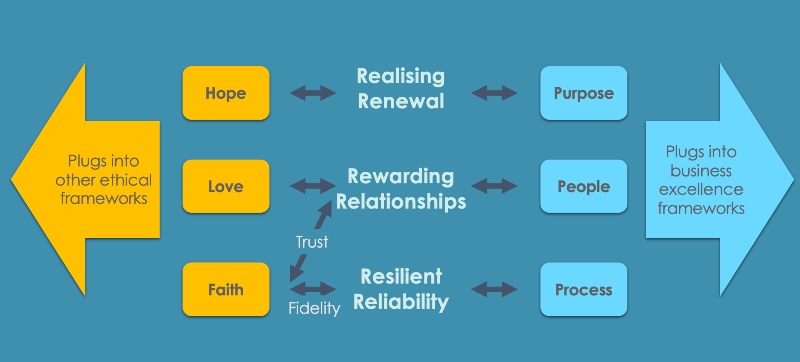Is God at work?
There are businesses trying to work out what a better work/life balance could look like in an always on world, which means, as Christians, we are living in a potentially fruitful time
The fifth and final part of the series Is Kingdom working? by Phil Hanson and Terry Young

Most of us are aware of Christians who influenced the start of the industrial age, for instance, through Peter Lupson’s, In God’s Company (reviewed here), or Ian Bradley’s Enlighted Entrepreneurs. These pioneers were swimming against the tide and the mills of Manchester, for instance, drove Engels to communism rather than Christianity. Here we take a different line and look for evidence that primal hungers affect even secular thinkers and have done so all along.
Henry Ford was not a keen churchgoer, and Rose Wilder Lane (Henry Ford’s own story) quotes him as saying, ‘I see no use in spending a great deal of time learning about heaven and hell. In my opinion, a man makes his own heaven and hell and carries it around with him. Both of them are states of mind.’ Moreover, in raising salaries as high as the business would bear or setting up a free technical training institution (My life and work, Project Guttenberg), he argues that they were not charity but enlightened self-interest. He wanted, for instance, a workforce that could buy his cars!

Clearly Henry Ford pioneered key aspects of the blue side of the RR3 Framework – promoting Lean practice decades before Deming or Ohno – but it is probably safe to say that his ‘orange’ aspirations were not based on a personal relationship with Jesus.
So why does he stray to the orange side at all? Why would he count how many disabled men worked in his factories?
A Christian commentary on the RR3 Framework is that as a fallen race, humanity reveals vital virtue alongside deeply flawed behaviour (which in Ford’s case included support for Hitler). It wasn’t just mill owners who engineered the servitude of workers. As noted in the last blog, exploitative contracts, employers paying less than the living wage, and schedules that drive people for a pittance, are still around. So too, are companies seeking bluer solutions, supporting generous social engagement schemes, and attempting to put creativity centre stage.
This mix of the glorious and the grotesque is exactly how Scripture paints humanity, so it is not surprising to see it reflected in the workplace. The Church, when it comments at all, tends simply to condemn the cruelty, the vice, the greed, the excess.
Writing at the end of the Great War, another pioneer of best practice, HL Gantt (Organising for Work, 1919), concluded by commending his approach and says, ‘Moreover, it conforms absolutely to the teachings of all the churches, for Christ, who was the first to understand the commanding power of service, thus stands revealed as the first great Economist, for economic democracy is simply applied Christianity. This was also clearly understood by the great leaders of the Church of the middle ages, whose failure to establish it as a general practice was largely due to the rise of an intellectualism which disdained practicality.’
The RR3 Framework enables us to acknowledge genuine responses to valid longings and seek to nurture them. In our first blog, we cited the more enlightened aspects of Amazon’s approach (Bryer and Carr, Working backwards), particularly its relatively low salary limit for all, with bonuses being in company stock to encourage staff to take the long term view.
However, it isn’t difficult to discover another side, of warehouse staff who leave after eight months (Guardian, 4 Feb 2022), or the UK’s Competition & Markets Authority deciding to investigate its treatment of third-party sellers (The Times, 7 Jul 2022).
As Christians, we know the planet cannot be saved from the blue side of our framework. Business process is too self-absorbed to recognise its own limits, while business purpose is too fragile to avoid being mastered by the few against the many. Business may offer salvation to some but by itself it cannot save all, and all too often it exploits those it will not save.
The RR3 Framework identifies a space where Christians can engage with those of other ethical persuasions, to praise what is praiseworthy, even – especially! – at work.
As the new knowledge companies try to define what ethical behaviour looks like – and some of their ideas are better grounded than those you will hear from many pulpits – they are stepping squarely into the orange side of the RR3 Framework. As they do, someone needs to greet them with a coherent salvation narrative that represents a meaningful response to their quest.
The former Archbishop, Rowan Williams is generally credited with the view that mission involves seeing what God is doing and joining in. On that basis our framework provides a sort of map for mission and shows why, as Christians, we are living at a particularly fruitful time.
First, we have seen that God has not forgotten about the workplace but has seeded it with longing, especially from the start of our industrial era. We can connect the best of human endeavour with the very best that God has in mind.
Second, we can see where to join in with good that is already going on – and has been going on for over a century. We are not suggesting that Christians be relieved of their responsibility to stand against exploitation, cruelty and greed but we also recognise a mandate to apply that old fashioned principle of overcoming evil with good (Romans 12:21). With the RR3 Framework, we have a heat map of where that good is concentrated and where we may be most warmly welcomed.
Third, we have a gospel narrative that aligns with a contemporary quest, for we know business leaders are searching for satisfaction in the very areas where our message is most unchanging.
God is at work in the world of business as God is at work everywhere and always has been. What is different is that as Christians we can now see that we have a legitimate message that matches widely articulated need. Time to roll up our collective sleeves and join in!
Image | cetteup | Unsplash
This is part of a five part blog series called Is Kingdom Working? Access all the blogs here:
-
Is Kingdom working? New blog series in which Phil Hanson and Terry Young explore how human longings and behaviour play out in making business a platform for the Kingdom. Can Christian values and modern best business practices genuinely align? And if so, how? The first blog highlights the longings of people
-
A lens on the Kingdom The second part of the blog series Is Kingdom working? attempts to try to understand the kingdom without parables - and then introduces a framework that connects business best practice to ethical virtues
-
Can business deliver Kingdom? Is there such a thing as Kingdom business? Part three of the series Is Kingdom working?
-
Spoiling the job The bad fruit highlighted in Galatians 4 represents the very behaviour that spoils work. Here's a brief look at how
-
Is God at work? There are businesses trying to work out what a better work/life balance could look like in an always on world, which means, as Christians, we are living in a potentially fruitful time
Phil Hanson is an engineer by profession. For the latter part of a 30 year career in IBM, he was Lead Principal for IBM’s Manufacturing Industry Consulting Practice. Since IBM, he has been Principal Industrial Fellow at the Institute for Manufacturing at Cambridge University and a Special Advisor to UNIDO for supply chain projects in Africa. He is ordained in the Church of England.
Terry Young is a missionary kid who read science and engineering. After a PhD in lasers, he worked in R&D before becoming a professor, when he taught project management, information systems and e-business, while leading research in healthcare. He set up Datchet Consulting to have fun with both faith and work and worshipped at Baptist churches in Slough for 19 years before moving to the New Forest.
Do you have a view? Share your thoughts via our letters' page.
Baptist Times, 19/10/2022